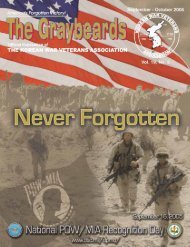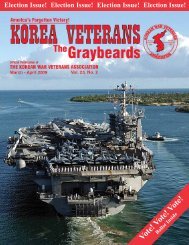Mar/Apr 2013 - Korean War Veterans Association
Mar/Apr 2013 - Korean War Veterans Association
Mar/Apr 2013 - Korean War Veterans Association
You also want an ePaper? Increase the reach of your titles
YUMPU automatically turns print PDFs into web optimized ePapers that Google loves.
subjected to the same conditions. The field<br />
combat conditions experienced by personnel<br />
of the 187th ARCT during the period<br />
Dec ‘50 -Jan ‘51 while holding front-line<br />
positions on the high ground surrounding<br />
Punji Pass were comparable to the Eastern<br />
Front in WWII..<br />
The terrain elevations on both sides of<br />
the pass averaged between 350 to 500<br />
meters in height. The secondary level road<br />
(unpaved) through the pass was at about<br />
150 meters, with precipitous bluffs on<br />
each side of the pass. The mission of the<br />
187th ARCT was to deny to the enemy<br />
(Corps sized Chinese Communist<br />
‘Volunteer’ Forces [CCF]), use of the pass<br />
and control of the commanding terrain on<br />
either flank.<br />
The 187th was able to blunt the CCF<br />
thrust to take the pass and was successful<br />
in taking control of the commanding high<br />
ground overlooking it. However, the CCF<br />
continued to attack over the following<br />
days until they too had to acknowledge the<br />
almost impossible combat environment<br />
because of the weather conditions.<br />
Accordingly, they established their front<br />
line positions opposite ours on the military<br />
crest side of the high ground we held.<br />
It was apparent from prisoners we captured<br />
that their troops were as ill-equipped<br />
as we, if not more so, for that kind of combat<br />
under those weather conditions.<br />
Neither we nor the enemy had winter<br />
clothing and/or shelter. Nor could either<br />
side keep their infantry weaponry functioning<br />
as it was intended to. That didn’t<br />
lessen their continuing attempts to take<br />
our positions——but it did mean they<br />
could not gain observed indirect fire superiority<br />
or even numerical superiority due<br />
to the limited routes of approach that we<br />
could interdict by observed indirect fire.<br />
The prevailing weather conditions for<br />
the period Dec ‘50-Jan ‘51 were the worst<br />
recorded in several decades and are<br />
defined as one of the most severe winters<br />
experienced in that area. Temperatures as<br />
low as 30 to 35 degrees below zero<br />
(Fahrenheit) were common, particularly in<br />
the hours of darkness. As well, winds of<br />
30 to 50 knots were frequent in the operational<br />
area extending from frontline trench<br />
and foxhole position to rear areas. These<br />
conditions were exacerbated by frequent<br />
snow and ice storms.<br />
The front-line infantry personnel of the<br />
187th ARCT occupied positions on both<br />
the military and topographical crests of<br />
the mountainous terrain flanking the pass.<br />
The terrain was denuded of any timber<br />
growth and there were too few areas<br />
below the topographical crest where some<br />
terrain shelter from the wind was possible.<br />
The only areas of relief were the heating<br />
tents, etc., that were erected in the battalion<br />
and regimental rear areas. These were<br />
accessible on an extremely limited basis<br />
when enemy activity was low or negligible,<br />
and personnel could be sent to the rear<br />
to recuperate. The average was one out of<br />
four on the front line and one of three in<br />
secondary supporting positions allowed to<br />
go to rear areas to warm up get some hot<br />
food. Individual combat rations were<br />
impossible to eat, as they were frozen.<br />
Even attempting to use squad Bunsen<br />
burners to melt snow in a canteen cup or<br />
helmet to make coffee, soup, etc., was<br />
next to impossible in daytime and a fatal<br />
act at night, as it was almost certain to<br />
draw enemy fire! Besides, there was no<br />
resupply available or possible for the pellets.<br />
Even lighting a cigarette was difficult<br />
because the infamous ZIPPO found it hard<br />
to cope with that kind of weather.<br />
Most men spent almost all their time in<br />
(or wrapped up) in their sleeping bags and<br />
ponchos, even while in their foxholes.<br />
Officers and NCOs had to constantly walk<br />
the line of foxholes and gun emplacements<br />
to force troopers to move their arms<br />
and legs to prevent freezing. Lethargy was<br />
a death sentence!!!!!<br />
It is important to note that the personnel<br />
of the 187thARCT were ill-equipped<br />
for the harsh winter conditions. Winter<br />
(Arctic) equipment had not been issued to<br />
the entire ARCT. Most of the men had<br />
only pile-lined field jackets for outer wear.<br />
Few had SnoPac boots. Most did have<br />
pile-lined head covers that could be worn<br />
under the helmet.<br />
There were two primary reasons for<br />
such inadequate equipping: (a)<br />
Insufficient stocks in the combat zone and<br />
(b) the 187thARCT had been one of the<br />
units contemplated for return to the U.S.<br />
in early winter 1950 (Nov), prior to the<br />
CCF incursion. Thus, the issuing of such<br />
equipment, even if available, would not<br />
have transpired prior to the CCF incursion.<br />
By the time it became apparent that a<br />
“new war” had started, it was not possible<br />
to meet the logistic requirements to ensure<br />
timely and proper equipage of units and<br />
personnel for the height of the ‘50-‘51<br />
winter season. The degree of frostbite and<br />
frozen extremities to the front line personnel<br />
was so high it gave concern to combat<br />
effectiveness of front line infantry companies,<br />
especially if the CCF, having been<br />
denied the high ground, would decide to<br />
mount another major attempt.<br />
The cases of frostbite and frozen<br />
extremities were aggravated by accompanying<br />
severe colds, cases of pneumonia,<br />
and respiratory problems, not only among<br />
the frostbitten, but also those not frostbitten.<br />
Company commanders, platoon leaders<br />
and senior NCOs had to exert every<br />
ounce of leadership to discipline and<br />
coerce their troops to take appropriate<br />
means to cope with the extreme weather<br />
conditions, while trying to cope with them<br />
themselves! However, the undeniable<br />
truth was that we were just not prepared<br />
for what we faced!<br />
That the mission given the 187th to<br />
take and hold Punji Pass was successful is<br />
due to the indefatigable elan of the airborne<br />
soldier and his ability to cope with<br />
conditions for which no training could<br />
prepare him!<br />
Footnote: (The ‘why’ of this story!!!)<br />
From 1987-1995, I was a member of the<br />
<strong>Korean</strong> <strong>War</strong> <strong>Veterans</strong> Memorial Advisory<br />
Board appointed by President Reagan. Our<br />
duty was to select a site, design, raise<br />
funds and dedicate the <strong>Korean</strong> <strong>War</strong><br />
<strong>Veterans</strong> Memorial. Our Board Chairman<br />
was General Richard G. Stilwell, USA<br />
(Ret.), a Far East expert who was well<br />
known to the Chinese military. As such,<br />
he was like a ‘kindred spirit’ to his counterparts<br />
in the Chinese military hierarchy.<br />
Strangely enough, there is that kind of<br />
mutual respect that lies beneath the surface<br />
of those who follow a military career.<br />
While the prospect of being enemies is<br />
always present, the mastering of the profession<br />
is mutually understood and makes<br />
interaction possible.<br />
Gen. Stilwell received an invitation to the<br />
Chinese Embassy to meet and welcome<br />
their new military attaché, a Chinese<br />
Major General who had some previous<br />
contact with Stilwell. It was a military<br />
‘Mess Dress’ type affair and Stilwell asked<br />
69<br />
The Graybeards <strong>Mar</strong>ch - <strong>Apr</strong>il <strong>2013</strong>

















